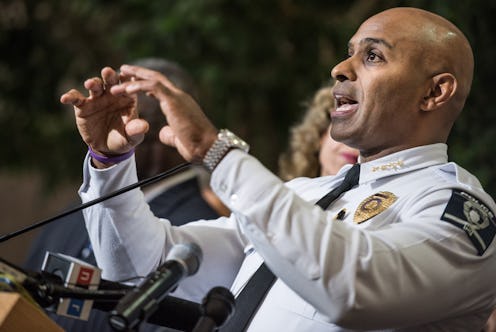News
Charlotte Police Won't Release Shooting Video
Despite public outcry that has fueled two nights of protests throughout the city, Police Chief Kerr Putney has announced that Charlotte-Mecklenburg police will not release the video from the Keith Lamont Scott shooting. This decision to withhold the officers' dashboard camera footage from the public comes just hours after North Carolina Gov. Pat McCrory declared a state of emergency and moved the National Guard and state troopers into the city. The department says it has no intentions of releasing the footage in the future.
CNN reported that when asked why the footage would not be released to the public, Putney responded, "Transparency's in the eye of the beholder. If you think we should display a victim's worst day for public consumption, that is not the transparency I'm speaking of." Additionally, the department says that the video would likely do little to calm public unrest, warning that the footage showed no "definitive visual evidence" that Scott was pointing a gun at officers during the time of the shooting. "I can tell you this: There’s your truth, my truth, and the truth," Putney said. "Some people have already made up their minds."
This lack of "definitive visual evidence" displayed in the video has not dissuaded the department from siding with officers' original account of the shooting, however. The department claims that witness testimony and other evidence — including officers allegedly finding a gun at the scene, as opposed to a book as family members claimed — backs up their narrative that Scott posed an "imminent deadly threat."
Spokesman for the Charlotte Fraternal Order of Police Todd Walther claims the video shows that Scott in possession of a gun and an ankle holster. He told CNN the footage shows that Scott was "an obvious threat" to officers during the time of the shooting. After viewing the video, the Scott family lawyer said, "the family again has more questions than answers." A statement from the lawyer read:
When told by police to exit his vehicle, Mr. Scott did so in a very calm, non-aggressive manner.
While police did give him several commands, he did not aggressively approach them or raise his hands at members of law enforcement at any time.
It is impossible to discern from the videos what, if anything, Mr. Scott is holding in his hands.
Perhaps conveniently for the state, Gov. McCrory recently signed a bill into law that prohibits the release of body and dashboard camera footage to the public with limited exceptions. The new law will go into effect in October. When signing the bill, McCrory (also known for his disastrous anti-LGBTQ HB2 legislation) said: "Technology like dashboard cameras and body cameras can be very helpful, but when used by itself technology can also mislead and misinform, which causes other issues and problems within our community."
Huh.
